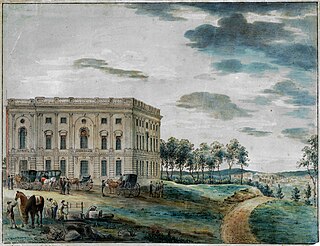This article's factual accuracy is disputed .(September 2009) (Learn how and when to remove this template message) |
This is a complete list of members of the United States Senate during the 10th United States Congress listed by seniority, from March 4, 1807, to March 3, 1809.

The United States Senate is the upper chamber of the United States Congress, which along with the United States House of Representatives—the lower chamber—comprises the legislature of the United States. The Senate chamber is located in the north wing of the Capitol Building, in Washington, D.C.

The Tenth United States Congress was a meeting of the legislative branch of the United States federal government, consisting of the United States Senate and the United States House of Representatives. It met in Washington, D.C. from March 4, 1807, to March 4, 1809, during the seventh and eighth years of Thomas Jefferson's presidency. The apportionment of seats in the House of Representatives was based on the Second Census of the United States in 1800. Both chambers had an overwhelming Democratic-Republican majority.
Contents
Order of service is based on the commencement of the senator's first term. Behind this is former service as a senator (only giving the senator seniority within his or her new incoming class), service as vice president, a House member, a cabinet secretary, or a governor of a state. The final factor is the population of the senator's state. [1]

The vice president of the United States is the second-highest officer in the executive branch of the U.S. federal government, after the president of the United States, and ranks first in the presidential line of succession. The vice president is also an officer in the legislative branch, as President of the Senate. In this capacity, the vice president presides over Senate deliberations, but may not vote except to cast a tie-breaking vote. The vice president also presides over joint sessions of Congress.

The United States House of Representatives is the lower house of the United States Congress, the Senate being the upper house. Together they compose the national legislature of the United States.

In the United States, a governor serves as the chief executive officer and commander-in-chief in each of the fifty states and in the five permanently inhabited territories, functioning as both head of state and head of government therein. As such, governors are responsible for implementing state laws and overseeing the operation of the state executive branch. As state leaders, governors advance and pursue new and revised policies and programs using a variety of tools, among them executive orders, executive budgets, and legislative proposals and vetoes. Governors carry out their management and leadership responsibilities and objectives with the support and assistance of department and agency heads, many of whom they are empowered to appoint. A majority of governors have the authority to appoint state court judges as well, in most cases from a list of names submitted by a nominations committee.
The two main parties at this point were the Federalists (F), and Democratic Republicans (DR)